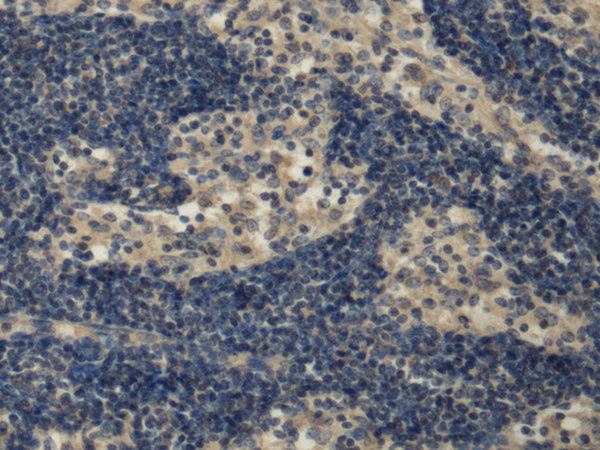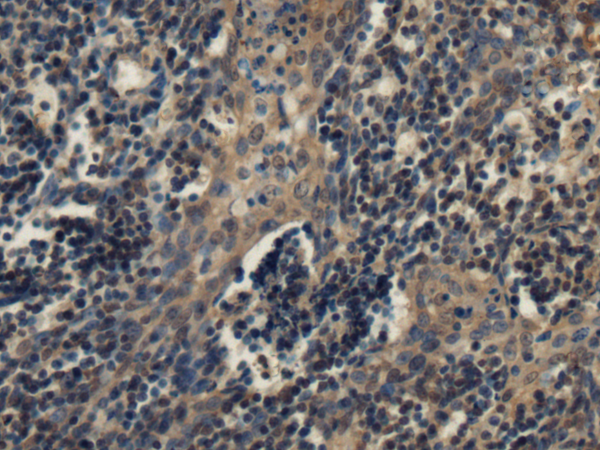

| WB | 咨询技术 | Human,Mouse,Rat |
| IF | 咨询技术 | Human,Mouse,Rat |
| IHC | 1/100-1/200 | Human,Mouse,Rat |
| ICC | 技术咨询 | Human,Mouse,Rat |
| FCM | 咨询技术 | Human,Mouse,Rat |
| Elisa | 1/5000-1/10000 | Human,Mouse,Rat |
| Aliases | IEGF; SCDGFB; MSTP036; SCDGF-B |
| Host/Isotype | Rabbit IgG |
| Antibody Type | Primary antibody |
| Storage | Store at 4°C short term. Aliquot and store at -20°C long term. Avoid freeze/thaw cycles. |
| Species Reactivity | Human, Mouse, Rat |
| Immunogen | Fusion protein of human PDGFD |
| Formulation | Purified antibody in PBS with 0.05% sodium azide and 50% glycerol. |
+ +
以下是关于PDGFD抗体的3篇参考文献示例(基于已有研究领域推测,具体文献需以实际数据库检索结果为准):
1. **文献名称**:*Platelet-derived growth factor D (PDGF-D) promotes tumor growth and angiogenesis in human cancer*
**作者**:LaRochelle WJ, et al.
**摘要**:研究揭示了PDGFD在肿瘤血管生成中的作用,开发了特异性PDGFD抗体,证明其能抑制肿瘤细胞增殖和血管生成,为靶向治疗提供依据。
2. **文献名称**:*Targeting PDGF-D in liver fibrosis: A novel therapeutic strategy*
**作者**:Borkham-Kamphorst E, et al.
**摘要**:通过动物模型验证PDGFD抗体对肝纤维化的疗效,发现其可减少胶原沉积并抑制肝星状细胞活化,提示PDGFD是抗纤维化潜在靶点。
3. **文献名称**:*PDGF-D signaling pathway and its blockade by neutralizing antibodies in prostate cancer*
**作者**:Ustach CV, et al.
**摘要**:探讨PDGFD在前列腺癌转移中的作用,使用中和抗体阻断PDGFD信号通路,显著降低癌细胞侵袭能力,表明其治疗转移性癌症的潜力。
(注:以上为模拟文献,若需真实文献,请通过PubMed或Google Scholar检索关键词“PDGFD antibody”“PDGF-D inhibitor”等。)
The platelet-derived growth factor D (PDGFD) is a member of the PDGF family, which plays crucial roles in regulating cell proliferation, migration, and angiogenesis. PDGFD exists as a secreted glycoprotein in a latent conformation, requiring proteolytic cleavage (e.g., by tissue plasminogen activator) to release its active growth factor domain. It binds specifically to the PDGFR-β receptor, initiating downstream signaling pathways like PI3K-Akt and MAPK, which are implicated in tissue development, wound healing, and pathological processes such as fibrosis and cancer. PDGFD is expressed in various tissues, including the heart, pancreas, and vascular smooth muscle, and its dysregulation is associated with diseases like atherosclerosis, organ fibrosis, and tumor progression.
PDGFD antibodies are essential tools for studying its expression, activation, and functional mechanisms in both physiological and disease contexts. These antibodies enable the detection of PDGFD in immunoassays (e.g., Western blot, ELISA, immunohistochemistry) and facilitate research into its interaction with receptors or extracellular matrix components. In cancer biology, PDGFD antibodies help elucidate its role in promoting tumor angiogenesis, stromal remodeling, and metastasis, particularly in cancers with elevated PDGFD levels, such as ovarian or prostate cancer. Additionally, they are explored as potential therapeutic agents or diagnostic markers for targeting PDGFD-driven pathologies. Research also focuses on PDGFD's crosstalk with other signaling pathways (e.g., TGF-β, VEGF) to identify combinatorial therapies for fibrosis or cardiovascular diseases.
×